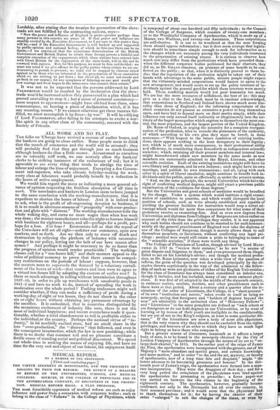ALL WORK AND NO PLAY.
THE folks on 'Change have revived a custom of earlier hours, and the bankers are going to close earlier. Some people seem to think that the march of commerce and the world will be arrested : they will probably find that they get through just as much business although bankers do dine a little sooner. Accustomed as ourselves are to tolerably stiff work, we can scarcely allow the bankers clerks to be striking instances of the endurance of toil; but it is agreeable to see every thing that tends to abridge the time of labour and enlarge the time of enjoyment. Excepting a few Govern- ment red-tapemen, who take chronic holyday-making for work, every class of labourers would probably benefit by a reduction in the hours of active employment.
We would fain regard the move as indicating a more general ad- vance of opinion respecting the fruitless absorption of all time in work. The merchants and bankers in London seem to have jumped to the same conclusion with the working-manufacturers, that it is expedient to shorten the hours of labour. And it is indeed time to ask, what is the profit of all-engrossing devotion to business, if it is to result in alternate seasons of " prosperity" with over-produc- tion and gluts with " distress." The working-manufacturer toils the whole waking day, and earns no more wages than when less work was done ; the master-manufacturer robs the night to harrass himself with business for eighteen hours, and all—perhaps for a profit, per- haps for a loss. Cui bores F Economists tell us that the repeal of the Corn-laws will set all right—unfetter our commerce, open new markets, and so forth. Are we then only to stave off death and destruction by relieving the plethora of industry with successive changes in our policy, letting out the belt of our laws season after season ? And perhaps it might be necessary to do so faster than the progress of opinion would render practicable 1 The working- classes call for a " ten-hours bill," and their masters appeal to the rules of political economy to prove that there cannot be compul- sory restrictions on the periods of labour : suppose, however, that the masters were to supersede the demand by a voluntary curtail- ment of the hours of work—that masters and men were to agree to a virtual ten-hours bill by adopting the custom of earlier rest ? Is there so much advantage in toiling without intermission throughout 1837-40, in order to pile up warehouses with unsaleable goods in 1841-2 and have no work to do, instead of spreading the work in moderation over the whole period ? Pushing tradesmen might well consider whether, if they can make a sufficiency of profit during a working-day of eight or ten hours, they do not throw in the other six or eight hours without obtaining any permanent advantage by the sacrifice. It is undoubted, that in countries distinguished by the monstrous excitement of industry like ours, there is not the most of individual happiness; and recent events have made it ques- tionable, whether a total abandonment to toil is profitable either to the individual or the country. Perhaps the national virtue of "in- dustry," in its morbidly excited state, had no small share in the late "over-production," the " distress " that followed, and even in the consequent insurrection, which the law is now punishing ; while there is no doubt that constant toil and no pleasure constitute a fertile cause of standing social and political discontent. We spend our whole time in seeking the means of enjoying life, and have no time for the very end and object of our labour, the enjoyment itself.


























 Previous page
Previous page